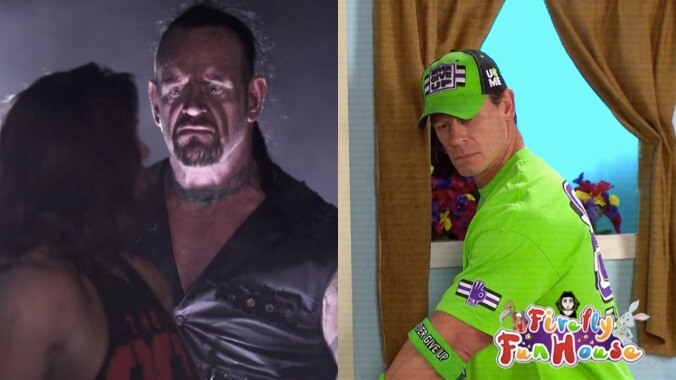The weirdest Wrestlemania of all time at least figured out how to use its legends


Wrestlemania 36 was never going to feel like a Wrestlemania, not after the crowds were locked out due to, as WWE brass put it, our “current circumstances.” Due to concerns over the spread of the coronavirus, Vince McMahon and company shuffled whatever wrestlers weren’t already hacking up a lung into the WWE Performance Center in Orlando, where matches and promos unfolded beneath ceiling fans to utter silence and empty chairs. It was surreal and sorta lonely, a demonstration of how vital the hum and roar of a live audience is to the theater that is professional wrestling.
For Wrestlemania, an event that thrives on spectacle and pageantry as much as it does a captive audience, would occur in that hollow, cavernous square is a joke. The sheer vastness of the event, punctuated by cacophonous fireworks, has long been a selling point, as has its breadth of “legitimate” celebrity: Saturday Night Live’s Colin Jost and Michael Che hosted last year’s show and, every few years, The Rock briefly departs the A-list, flamethrower in hand, to honor his old stomping grounds. Wrestlemania is where Triple H arrives flanked by skeletons, where Shane McMahon leaps off cages, and where the adults who grew up watching The Undertaker wait impatiently for that first spine-tingling dong of his theme song, desperate to remember what it was like when all of this seemed so real.
Wisely, WWE didn’t try to replicate any of that this year. Nor did they attempt to manifest the weird pirate theme of the event’s ads, outside of a silly, amusing intro package that was filmed when Roman Reigns, who dropped out of the show last week due to him being immunocompromised, was still on the card. NFL legend and new WWE signee Rob Gronkowski “hosted” the show, in that he gave an intro spiel, danced during a few entrances, and wormed his way into a subplot around the very dumb 24/7 Championship (he disappeared halfway through night two, with Titus O’Neill taking his place). Wrestlers were introduced in silence. They wrestled in silence. They celebrated in silence. And, as anyone who’s watched Raw or Smackdown recently knows, this is a deafening silence, the sort that sucks the electricity from sequences that would otherwise pop a live crowd. As annoying as wrestling audiences can be, watching wrestling is meant to be a communal experience. Lacking that, what’s one to do? Fill the air with music? White noise? This needed something.
So, yeah, some matches suffered. Daniel Bryan and Sami Zayn is a match made in heaven, but weeks of toothless buildup, bad booking, and a general lack of dynamism turned it into a bummer. The same goes for Becky Lynch and Shayna Baszler, a listless and too-short battle that, when you consider the response both performers tend to extract from crowds, might have shifted into another gear in a packed stadium. But there was a lot of shoddy storytelling going into this year’s show. It’s great that Braun Strowman beat the snot out of Goldberg, but it might have resonated more if the company hadn’t just had the 53-year old Goldberg destroy The Fiend, a heretofore untouchable star, during a blood money PPV in Saudi Arabia—and, you know, done anything with Braun over the past few years. And not even 10,000 screaming fans could’ve helped that 37-minute slog between Randy Orton and Edge. Despite having a solid story behind it, the match itself barely engaged with the pair’s emotional complexity as they smashed each other into different parts of the Performance Center. There was a palpable rawness to the finish, when Edge was consumed by a numb, exhausted hatred, but the endless counts by the referee were such a drag. Yet again, a good Orton story culminating in an underwhelming match.
But the challenges of this year’s Wrestlemania served to highlight the strengths of other performers. Kevin Owens and Seth Rollins delivered an intense match with a killer swerve—that jump off the sign was as close to a traditional “Wrestlemania moment” as we got—but what they demonstrated that so many others didn’t was an ability to believably trash-talk through the silence. Their feud was paper-thin, but their ability to talk like actual human beings—a shockingly hard thing to do while punishing one’s body—helped make their match more present and, by extension, more intimate.
 Keep scrolling for more great stories.
Keep scrolling for more great stories.
